and the distribution of digital products.
DM Television
Unlock Efficiency: Top 10 Must-Have Open Source ERP Software
Enterprise Resource Planning (ERP) software centralizes vital business functions into a single integrated system. This improves efficiency, insights, and process optimization.
Traditionally, ERP solutions required costly licensing and maintenance fees that put them out of reach for many companies. However, open-source ERP options provide enterprise-level capabilities with a low price tag.
In this article, we explore the top 10 open-source ERP platforms for optimizing business operations.
What is an ERP Software?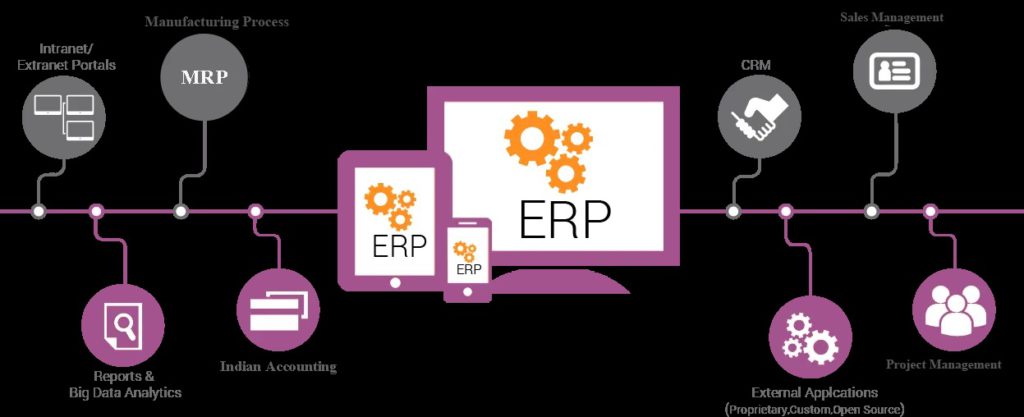
Enterprise Resource Planning (ERP) software stands at the heart of modern businesses, transforming how they operate. ERP systems are all-encompassing software suites that link different facets of a company’s operations. They make tasks smoother, information more accessible, and decision-making more data-driven.
ERP software has modules for finance, inventory management, human resources, customer relationship management (CRM), and other core functions. These modules work harmoniously, enabling businesses to automate routine processes, optimize resource utilization, and gain a comprehensive view of their operations.
Distinguishing Free and Open Source ERPIn the ERP landscape, the terms “free” and “open source” are occasionally used interchangeably, but they carry distinct meanings:
1. Free ERP: Free ERP software usually refers to proprietary solutions accessible at no charge. However, these versions may have restrictions, such as reduced features or limited support. They often serve as a gateway to more advanced paid options.
2. Open Source ERP: Open source ERP software goes beyond cost-free; it empowers users to modify the software as needed. It grants access to the source code, allowing organizations to tailor the software to their unique requirements. This flexibility is a hallmark of open-source ERP solutions.
Benefits of Harnessing ERP SoftwareImplementing ERP software, whether open source or proprietary, promises an array of advantages for businesses:
1. Streamlined Efficiency: ERP software streamlines operations, minimizing manual tasks and error risk, thus enhancing operational efficiency.
2. Integrated Data: These systems unite data from various departments, delivering real-time access to critical information. This fosters informed decision-making and improved in-house communication.
3. Cost Efficiency: By optimizing resource allocation and automating processes, ERP software can yield cost savings in terms of labor and inventory management.
4. Scalability: ERP systems are designed to expand alongside your business. As your company grows, the software can quickly adapt to accommodate additional users and functions.
5. Competitive Edge: A well-implemented ERP system can position your business ahead of the competition by improving customer service, product quality, and overall efficiency.
6. Regulatory Compliance: Many industries face stringent regulatory requirements. ERP software aids organizations in maintaining compliance and ensuring accurate records.
Key Considerations When Selecting ERP SoftwareChoosing the right ERP software is a pivotal decision for your organization. Here are critical factors to contemplate when making your selection:
1. Understand Your Business Needs: Begin by thoroughly comprehending your business requirements, recognizing the processes that need enhancement, the departments requiring integration, and the ideal features for your company.
2. Budget Alignment: Ensure the ERP system matches your budget by calculating the total cost of ownership, including licensing, implementation, maintenance, and training costs.
3. Customization: Gauge the level of customization your organization requires. Open-source ERP software offers unmatched flexibility, enabling you to shape the system to your exact specifications.
4. Support and Maintenance: Investigate the availability of support, updates, and maintenance services. For open-source ERP, assess the strength of the user community and the availability of professional help.
5. Scalability: Confirm that the ERP system can grow in step with your business and adapt to evolving needs over time.
6. User-Friendliness: Prioritize usability. An intuitive interface makes for a smoother transition and promotes user adoption.
7. Integration Capabilities: Ensure the ERP software seamlessly integrates with your existing software and hardware infrastructure.
Top 10 Open-Source ERP Software WP ERP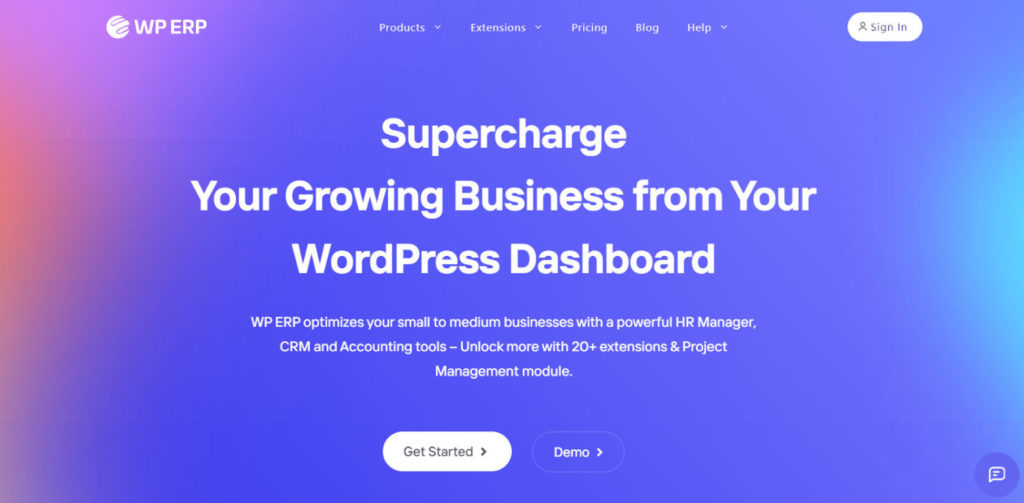
WP ERP is a robust open-source ERP solution built specifically for WordPress sites. With its modular architecture, WP ERP provides enterprise-level capabilities to optimize workflows:
- Extensive core modules, including accounting, HR, CRM, inventory, and project management, cover end-to-end business needs.
- The software is designed for easy installation, configuration, and management within WordPress for a familiar user experience.
- WP ERP integrates tightly with other WordPress plugins, allowing extending functionality as needed.
- The open API and webhooks enable connecting other apps and customizations.
- Faceted search and customizable dashboards provide insights into key data.
- Granular user roles and permissions support complex organizational structures.
- Packed with features, including multilocation inventory tracking, a customer portal, and more.
- Available in both cloud hosted and self hosted options.
With its modular architecture, robust capabilities, and WordPress integration, WP ERP offers an enterprise-grade ERP system designed specifically for the needs of WordPress sites at an affordable price. The active community support adds to its value as an open-source ERP option.
TRY WP ERP Dolibarr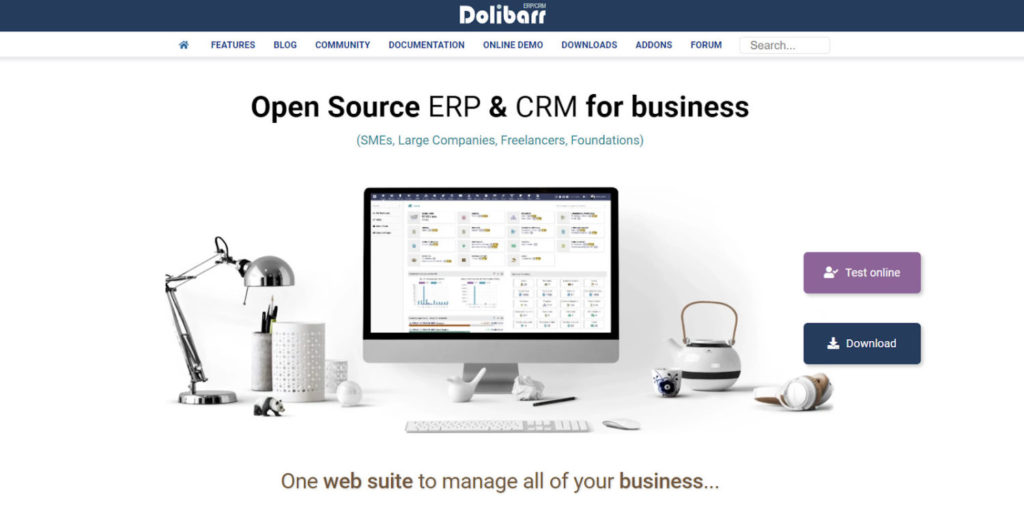
Dolibarr is an open-source ERP platform explicitly designed for small and mid-sized businesses. With its intuitive interface and extensive capabilities, Dolibarr makes robust business process automation accessible to SMBs:
- Core modules cover CRM, sales, invoicing, accounting, inventory, HR, and projects on an integrated platform tailored to SMB needs.
- The modern, responsive interface provides an excellent user experience on desktop and mobile.
- Tools like barcode/QR code support, point of sale, and Apple/Google Pay integration optimize operations.
- Customizable dashboards and reporting provide real-time insights into key business metrics.
- Modular architecture allows enabling only required features to start small. Additional modules are available as needs grow.
- Active community forum offers documentation, guides, and support.
- Available in both cloud hosted and self hosted deployment options.
- Integration capabilities like REST API and workflows allow connecting other business systems.
With its focus on usability, customization, and providing enterprise-grade capabilities to SMBs at zero cost, Dolibarr offers a feature packed open source ERP platform for organizations to streamline workflows and unlock growth.
TRY Dolibarr Apache OFBiz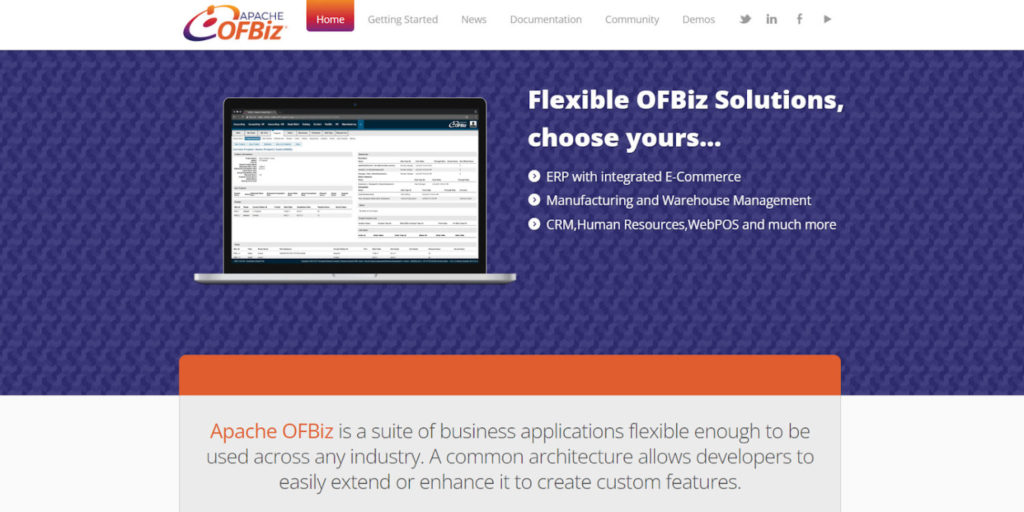
Apache OFBiz is an open-source enterprise automation suite with a flexible modular architecture. It provides a range of capabilities to streamline diverse business processes:
- The data model can flexibly accommodate various use cases without requiring custom coding.
- Core modules cover capabilities like CRM, e-commerce, accounting, inventory management, order processing, marketing, HR, and more.
- The SOA architecture integrates seamlessly with external systems via APIs and web services.
- Tight integration with Apache Solr provides powerful enterprise search capabilities.
- Modular design allows enabling only needed components to rightsize implementations.
- Extensive flexibility to model new processes and workflows as needs evolve.
- Available as on-premise or cloud hosted deployment.
- The vibrant community provides support, add-ons, and extensions.
OFBiz supports complex, heterogeneous business process requirements with its adaptable data model and modular architecture. Companies can optimize current workflows with ample flexibility to accommodate future needs as requirements change.
TRY Apache OFBIZ Metasfresh
Metasfresh is an open-source ERP solution focused on robust order, inventory, and accounting management for manufacturing and trading companies. Key features include:
- Extensive capabilities for sales quotations, order processing, purchasing, goods receipt, and invoicing to optimize Order to cash workflows.
- Real-time inventory tracking with batch/serial number management and barcode labeling support.
- Flexible goods receipt verification against purchase orders and contracts.
- Tools like batch costing, best-before date management, and packing features tailored for food production and distribution.
- Powerful reporting builders and dashboards provide insights and business intelligence.
- Responsive web interface accessible from desktop and mobile.
- On-premise and cloud hosting options are available.
- Open API enables integrations with external systems.
With its dedicated manufacturing and order management focus and strong usability, metasfresh provides an open-source ERP optimized for the unique workflows and needs of industrial and trading businesses at zero cost.
TRY Metasfresh Odoo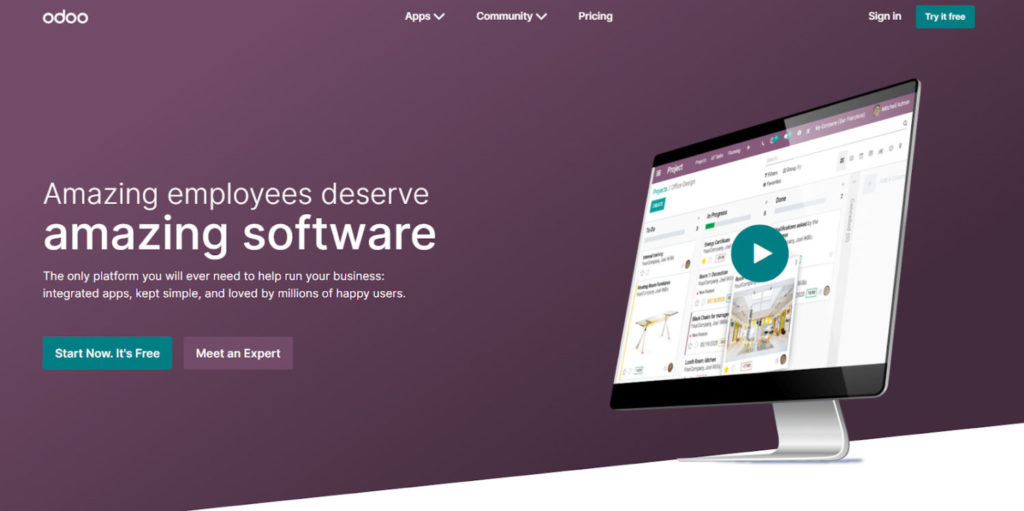
Odoo is a complete suite open-source ERP platform with dozens of business applications spanning CRM, e-commerce, accounting, inventory, manufacturing, HR, and more. Key features include:
- Modular architecture allows enabling only needed apps to rightsize implementations. Can activate other apps as needs evolve.
- A beautiful modern interface prioritizes usability and the user experience.
- Open API and thousands of add-ons allow extensive customization and integration.
- Available in both on premise and Odoo.sh cloud hosted options.
- The active global community provides assistance, custom add-ons, and localization.
- Scales from small businesses to large enterprises.
- Covers the end-to-end customer journey from marketing automation to sales to invoicing and customer service.
With its all-in-one modular platform spanning the entire value chain, Odoo aims to be the only business software companies need. The combination of usability, customizability, and breadth of features make it an appealing open-source ERP choice.
TRY Odoo ADempiere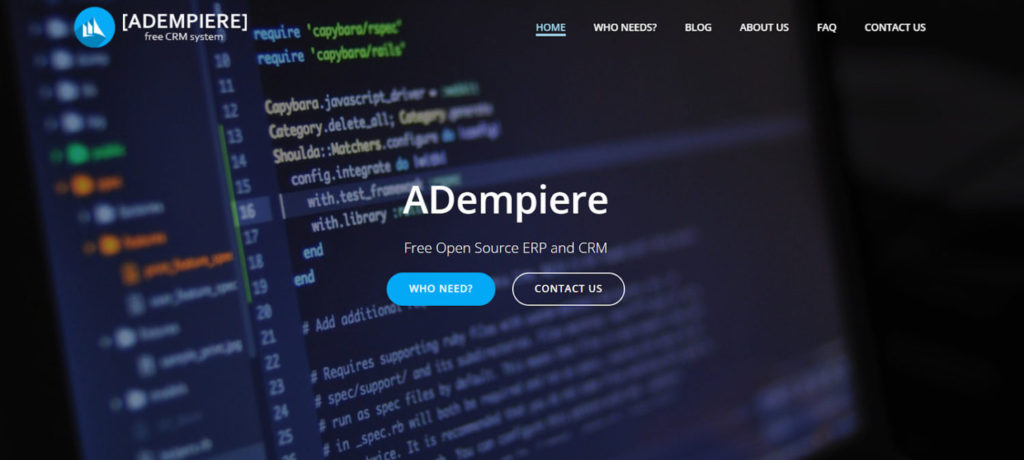
ADempiere provides an open-source ERP platform focused on meeting the complex requirements of global enterprise organizations. Key capabilities include:
- In-depth multilanguage and multicurrency support for international operations.
- Localization for over a dozen countries out of the box, with additional locales readily added.
- An integrated POS system supports both online and offline transactions.
- Core modules for financials, inventory management, manufacturing, POS, and more.
- Dashboards and reporting tailored for each user role.
- Workflow engine to model approval chains and business processes.
- Flexible deployment options, including on premise, cloud hosting, and hybrid.
- Secure access controls and data encryption.
- The vibrant community provides support, customizations, and extensions.
With its specialized features for global business needs combined with modern UI and modular extensibility, ADempiere offers a complete featured ERP to optimize complex multinational operations and workflows. The zero cost open source license makes it accessible to organizations of all sizes.
TRY ADempiere WebERP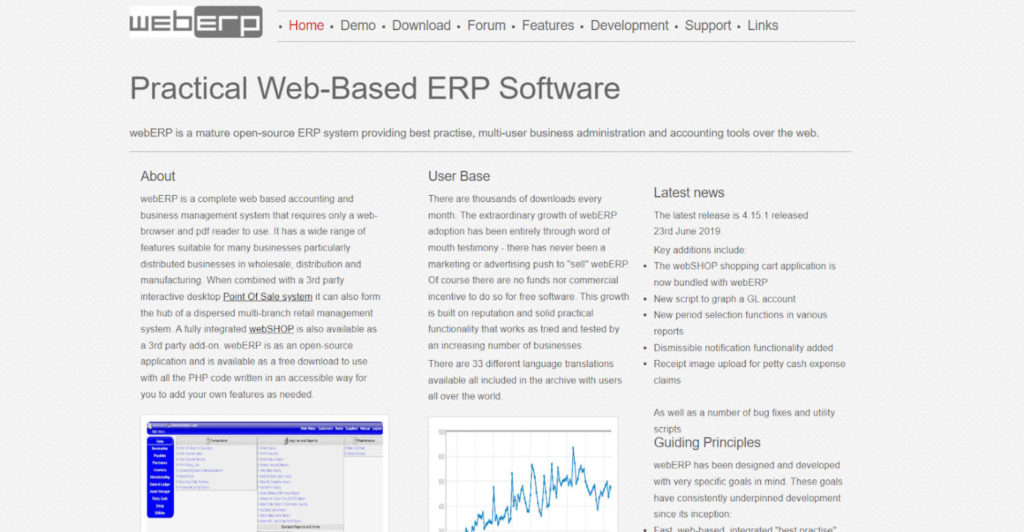
WebERP is an open-source ERP solution with robust accounting and financial management capabilities. Key features include:
- Comprehensive financials module covering accounts receivable, accounts payable, general ledger, and more.
- Additional modules like manufacturing, inventory, and POS are available à la carte.
- Browser-based access provides easy access from anywhere.
- Multi-tiered user roles and granular permissions support complex organizational structures.
- Custom reporting builder allows tailoring analysis to your needs.
- Multi-currency and multi-location support for global businesses.
- Modular architecture allows enabling only required capabilities.
- API for integration with other systems.
- Self-hosted on your servers for full control.
While WebERP specializes in accounting over end-to-end ERP, its modular setup and breadth of financial tools provide a solid open-source option for managing core accounting. Paired with other point solutions, it offers an affordable and scalable solution for growing businesses to streamline their finances.
TRY Web ERP Axelor ERP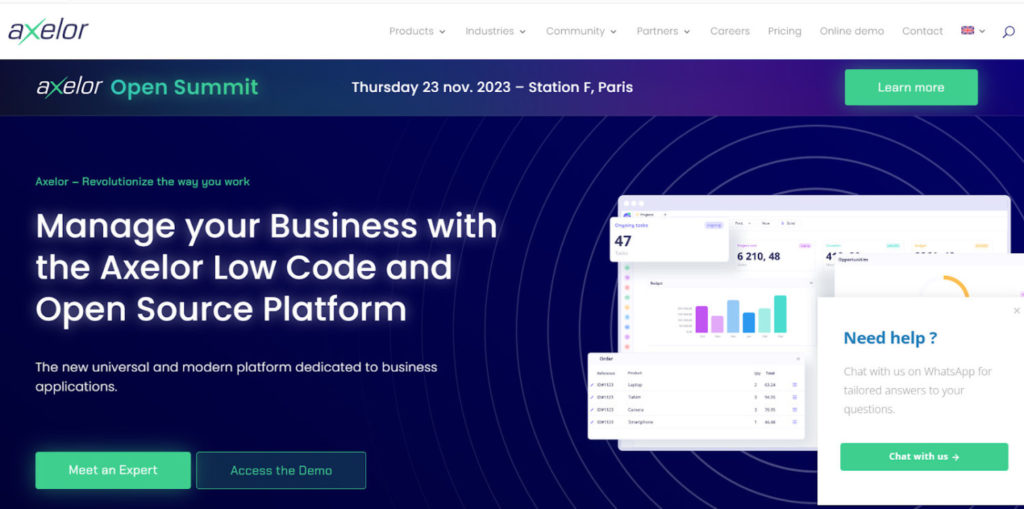
Axelor ERP provides an open-source modular ERP platform focused on extensibility and usability. Key features include:
- Beautiful modern UI and UX designed for maximum productivity and adoption.
- Modular apps spanning CRM, HR, accounting, inventory, manufacturing, and projects can be enabled as needed.
- Open API allows extensive customization and integration to tailor Axelor to your workflows.
- The responsive mobile-ready design provides access on the go.
- Robust access controls, encryption, and security mechanisms.
- On-premise and cloud hosting deployment options.
- Detailed documentation and guides were provided.
- Built on Java and Python for enterprise scalability and performance.
- An active community forum for assistance and collaboration.
Axelor combines the flexibility and customization of open source with an elegant design philosophy that focuses on user experience. This allows the implementation of both tailored and great-looking ERP to increase engagement and productivity.
TRY Axelor ERP ERPNext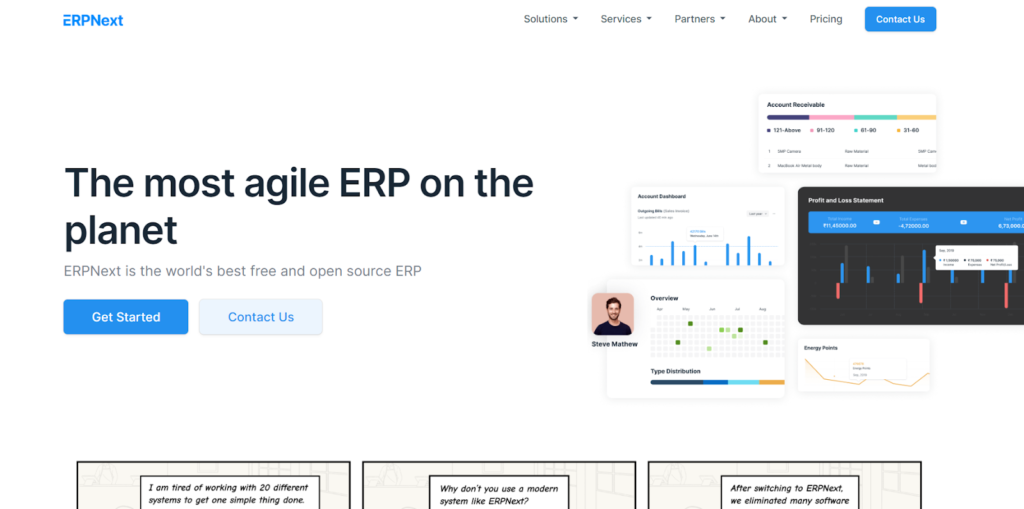
ERPNext is a full-featured open-source ERP system for modern small to medium-sized businesses. Key capabilities include:
- Modules covering CRM, accounting, inventory management, manufacturing, projects, HR, and more on an integrated platform.
- Intuitive web interface optimized for productivity and user adoption.
- Available as both cloud-hosted and on-premise installation.
- Customizable dashboards provide real-time insights into business metrics.
- Open API and webhooks allow connecting external apps or customizations.
- Granular user access controls and data security.
- Packed with features out-of-the-box, including POS, recurring invoicing, subscription management, and more.
- Mobile app provides access on the go.
- A vibrant community forum for implementation help and add-ons.
With its focus on usability, extensibility, and modern business process support tailored to SMBs, ERPNext enables growing organizations to streamline operations with enterprise-grade open-source ERP cost-effectively.
TRY ERP Next ConclusionOpen-source ERP solutions offer a flexible, affordable path to streamlining operations and gaining business insights. With their modular architectures, open APIs, and active user communities, platforms like ERPNext, Dolibarr, and Odoo provide enterprise-grade capabilities without enterprise-sized costs. By outlining your specific functional and technical requirements, you can find an open-source option well-aligned with your needs. Approach implementation as an ongoing process, starting with critical workflows and expanding functionality over time. With the right open-source ERP partner, your business can establish integrated, automated processes to optimize efficiency, visibility, and decision-making. Though requiring more internal ownership, open source delivers immense value, enabling growing businesses to trade manual inefficiencies for data-driven growth and competitive advantage cost-effectively.
Frequently Asked Questions (FAQ’s) What are the main advantages of open source ERP software?The main benefits are no licensing fees, full customization since the source code is accessible, vendor independence, strong security from the open source community, and scalability from small to large implementations.
Does open source ERP software require technical skills?Open source ERP requires more internal technical capabilities compared to proprietary systems. You need skills to install, manage updates, customize code, and troubleshoot issues without vendor support.
How does open source ERP software licensing work?Open source ERP has free usage rights under licenses like GPL and AGPL. However, paid support, hosting, training, custom development, and maintenance services are still available.
Does open source ERP provide mobile access?Many modern open source ERP options provide cross-platform web access and mobile apps to support access on the go across devices.
How are upgrades and maintenance handled?While no vendor handles updates, the community releases patches and new versions. Internal IT needs ability to upgrade on own schedule.
Is data secure with open source ERP?Open source platforms provide enterprise-grade security including encryption, access controls, and compliance certifications to keep data safe.
- Home
- About Us
- Write For Us / Submit Content
- Advertising And Affiliates
- Feeds And Syndication
- Contact Us
- Login
- Privacy
All Rights Reserved. Copyright , Central Coast Communications, Inc.